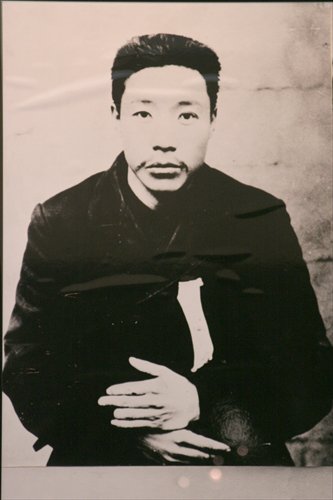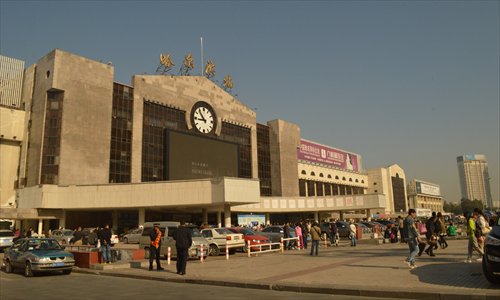HOME >> WORLD
Harbin's Heroic Korean
By Sun Xiaobo Source:Global Times Published: 2013-12-12 1:38:01

Ahn Jung-geun Photo: IC
When a train stops at the station in Harbin, Northeast China's Heilongjiang Province, passengers flood out of the carriages after their tiring journey dragging their luggage and hurrying toward the exit.
Few of them notice two small marks on the ground of the platform: a triangle and a square seven meters apart. They indicate the location where a breath-taking incident took place over a century ago.
On October 26, 1909, Ahn Jung-geun, a Korean independence activist, shot Hirobumi Ito, Japan's four-time prime minister and former resident-general of Korea, at Harbin railway station. Ahn was arrested on the spot while Ito, in Harbin for a scheduled meeting with a Russian representative in Manchuria, died shortly afterwards.
The triangle marks where Ahn pulled the trigger and the square marks the position of Ito.
The man dubbed a national hero by Koreans was sentenced to death by the Japanese colonial court and hanged the following year.
In June 2013, South Korean President Park Geun-hye suggested building a memorial to Ahn in Harbin when she met with Chinese President Xi Jinping during a visit to China.
The issue was brought up again in November by Park while meeting with China's State Councilor Yang Jiechi and aroused vehement opposition from Tokyo, which sees Ahn as a criminal.
China's foreign ministry on November 19 said that Ahn is a famous anti-Japanese fighter also respected by Chinese people and that China will press ahead with the work in accordance with regulations on foreign related memorials.
Despite the diplomatic rows between the East Asian neighbors, a staff member at Harbin railway station, surnamed Gao, told the Global Times that the erection of the monument started recently on the second floor of the station.
However, Gao said that he didn't take charge of the project and was ignorant of construction details.
Remembrance beyond borders
"We are so proud of being the family of Ahn," a man, surnamed Qu, told the Global Times how he felt when discovering Ahn's name on his wife's family tree.
The family of Qu's wife used to live in South Korea and her grandfather, a Korean activist, had been fighting against the Japanese invaders until his death. Her parents moved to China in the 1930s.
It's such a remote connection and it's fairer to see Ahn beyond being merely a relative, Qu said.
"Ahn's courage to fight against invasion and his patriotic efforts deserve respect and admiration from everyone," Qu noted.
Qu was echoed by Kim Young-uk, a South Korean who works in China.
"Every South Korean knows Ahn. We've learned about him in school and from books as well as TV series. We adore him just as the Chinese respect Guan Yu (known for his loyalty and righteousness)," Kim said.
However, being considered an extremely significant figure in Japan's modern politics, Ito's death was taken by the Japanese government in a different way.
"We have been telling the South Korean government that Ahn Jung-geun was a criminal," Chief Cabinet Secretary Yoshihide Suga, the government's top spokesman, said after China and South Korea announced cooperation on the monument.
Ito's death didn't have a substantive impact on Korea's 36-year colonial rule and Japanese policies regarding Northeast Asia, Lü Chao, director of the Korean Research Center at the Liaoning Academy of Social Sciences, told the Global Times.
"But the spirit Ahn stood for will stay," Kim said.
In March dozens of Japanese who admire Ahn's deeds erected a monument for him in Saga Prefecture, Japan to mark the 101st anniversary of Ahn's death, South Korea's Yonhap News Agency reported. This was the first such memorial by the Japanese side.

People walk in front of Harbin railway station, where Korean activist Ahn Jung-geun shot former Japanese politician Hirobumi Ito on October 26, 1909. Photo: CFP
11 days in Harbin
Born in Korea in 1879, Ahn had just an 11-day connection with Harbin.
In 1905, the Japan-Korea Treaty was agreed following the Russo-Japanese War. It made Korea a protectorate of Japan. Ito was appointed as the governor of Korea after the treaty was signed.
Ahn started a coal business at the age of 25 before providing education in Korea to enlighten his countrymen. He later joined the "righteous armies" to fight against the Japanese, which ended in defeat.
On October 20, 1909, Ahn learned from reports that Ito was going to Harbin and he came up with a plan for killing the senior politician.
He arrived in the Chinese city on October 22 and contacted some associates. Four days later, he avoided the Japanese guards at the train station and shot Ito three times as well as Ito's three Japanese companions.
Ahn was arrested by Russian police and soon handed over to the custody of Japanese army. Ahn then was transferred to another prison in Lüshun, Liaoning Province on November 1. He was jailed there until being hanged in March 1910.
Never forgotten
Harbin has never forgotten the historic incident.
There is an exhibition hall where Ahn's statue and placards detailing his activities throughout his 11 days in Harbin are on display, a staff member surnamed Quan told the Global Times.
The hall was first opened in 2006 and receives 30,000-50,000 visitors every year, with the majority coming from South Korea, Quan said, adding that the number of visitors has gradually risen in recent years.
Some stones are also erected in a park, which feature Ahn's Chinese calligraphy and his handprint.
The erection of the monument for Ahn may make Harbin more attractive for visitors from South Korea, and even North Korea, Wang Jing, a research fellow with the Harbin Academy of Social Sciences, told the Global Times.
Wang has studied the development of Ahn-themed tourism around Northeast Asia, which was designed to connect Ahn-related sites in the region and form several travel routes. The study was proposed to local government, but didn't work out.
"Among other reasons, only a small number of South Koreans make Harbin their destination and Ahn is not known to most of Chinese. There is also a lack of knowledge of history," Wang said.
China has received about 2.99 million South Koreans as of September, according to statistics released by China's tourism watchdog.
"The erection of the monument will work in telling people about the history, though it's difficult to predict whether people are interested in learning it,"Qu said.
Posted in: Asia-Pacific, Asia in Focus